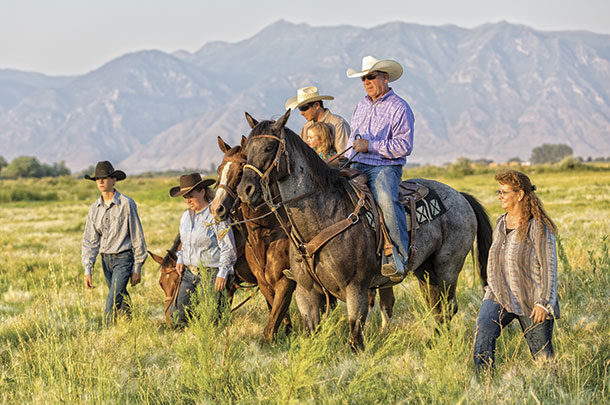Reading a bull sale catalog this winter, I came across this statement attributed to Bart Carmichael, “You can’t always do what Grandpa did, but don’t forget what Grandpa knew.”
The quote reminded me of the extensive foundation of families in agriculture and how fortunate we are to be in an industry so family oriented. In fact, the USDA reports family-owned farms remain the backbone of agriculture with 97 percent of all U.S. farms being family-owned. Knowing our nation’s farms and ranches have been and continue to be family-focused for multiple generations is something our industry can be proud of.
The opportunity to work alongside your parents, siblings or your children offers a unique environment not found in the traditional workplace. Working in step with your family to achieve success and longevity from one generation to the next can be a rewarding experience.
Maintaining sustainability also means adapting to the challenges presented when leading a family business and finding that middle ground between business principles and family dynamics. Finding the right balance requires leadership. Leading the discussions, leading the family team, leading the process to create and accomplish the vision. To lead a successful, multi-generational family business, consider these elements:
Create continuity
We can’t or shouldn’t implement everything Grandpa did, yet we can respect that the family business is still viable because of the forward-thinking business tactics Grandpa implemented. A family ranch would not be on its fourth, fifth or sixth generation without foresight from the prior generation. Continuity means preserving traditions but being open-minded to change, changes that will keep the business moving forward. If Grandpa didn’t test the waters with new genetics, new feeding programs or new grazing management options, would you still be in business today? Grandpa, in his time, was adopting what we now refer to as technology. How can we not only apply technology to the production practices impacting our ranch, but also technology from a business-minded standpoint?
- Are we recognizing and implementing the important elements of leading our business? This includes administering communication, financial, personnel and structural practices.
- Are we keeping the family informed, educated, updated and drawing on each of their passions for the business? Are we letting family members who excel in certain areas utilize those skills, or are we focused on trying to be so fair that we are expecting each family member fit a cookie-cutter mold?
- Are we open to the suggestions and input from the next generation?
- Are we asking the tough questions: How can we do things better? Do we have a structure in place? How does communication occur?
Be business-minded
I’m often surprised when I review the agenda for beef industry meetings, whether it be at the state, regional or national level, by the amount of emphasis on production-oriented topics and the limited focus on human resource-oriented topics. Are we overlooking how we achieve our goals and not equipping producers with the tools to help them excel in human resource and business management? Many issues can impact the ability to achieve the level of production on a ranch.
- Are roles and responsibilities clearly defined? Does everyone on the ranch know what is expected of them, how they fit into the bigger picture and how their skills and abilities help to achieve success?
- Are methods to enhance communication practiced? This is often the single-most important issue that can impact culture and sustainability. In family businesses, sometimes we overlook the need to include all individuals in the discussion. This pitfall can result in tension, frustration and lack of reinforcement.
- Are each other’s strengths and abilities clearly known? To work together as a team, the team must know each other. With families, we think we know each other very well, and in some cases, we might. However, I can’t stress enough the success I’ve seen in building relationships when individuals participate in training and discussion about strengths and personality traits.
- Are we focused on the vision, or working toward developing and refining a clear vision to give direction and inspire the family?
Be accountable
The traditional lines of a boss-to-employee relationship are blurred to a much greater extent in a family-owned business as work affiliations focus around a father and son(s) or daughter(s), brother to brother, etc. Accountability can be challenging to manage but can have great impact on outcomes. Accountability in family ranches should go both ways – the family leader needs to insist on accountability, and other family members need to practice accountability.
This comes back to being business-minded and realizing how a lack of accountability can negatively impact the sustainability of the ranch. Sit down, discuss it, write it down, and hold yourself and others accountable to what was discussed and agreed upon, and revisit the issue as needed.
- Are we aware of the family culture? How does family values, decision-making, communication and relationships shape the way we do business?
- Are we aware of the complexity of a family business? Are there continuing education opportunities for the family and individuals that can guide growth and development of the business and individuals?
Grandpa learned from experiences and you will too. Building leadership skills takes practice. Start chipping away today at the ways to invest in the growth and capabilities of your family-owned ranch, by deliberately investing the time and energy needed to overcome challenges and influence the continuation of your family ranch. ![]()
PHOTO: For a ranching operation to be sustainable, it requires a balance between business and family dynamics. The latter takes practice, lots and lots of practice. Getty Images.

-
B. Lynn Gordon, Ph.D.
- Consultant/Ag Writer
- LEADER Consulting
- Sioux Falls, South Dakota
- Email B. Lynn Gordon, Ph.D.
- Email B. Lynn Gordon, Ph.D.








